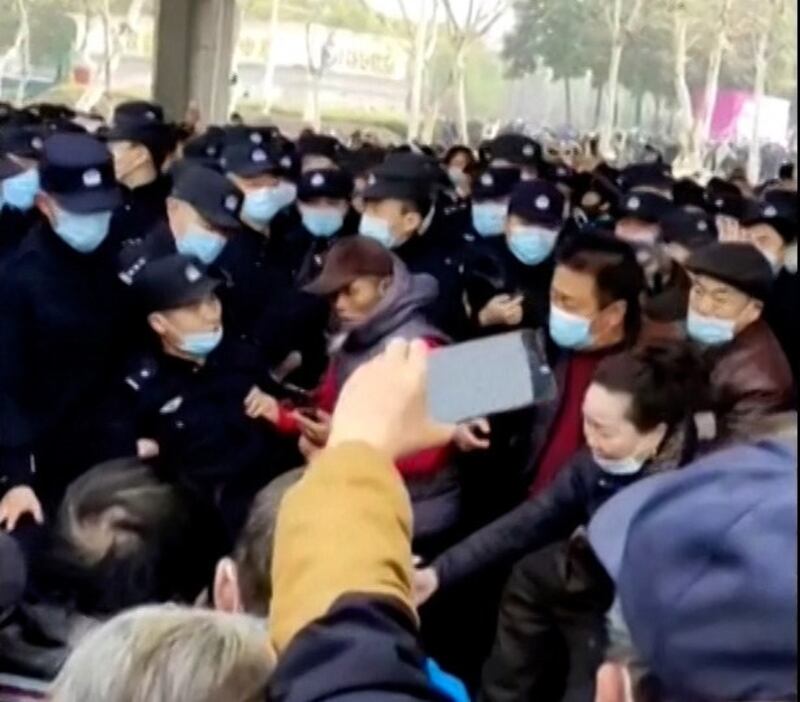Chinese police have detained at least five activists who supported recent mass protests in two major cities against the slashing of retirees’ medical insurance benefits earlier this month, Radio Free Asia has learned.
Among those detained was veteran rights activist Zhang Hai, who was picked up by authorities in the southern city of Shenzhen, a resident of Wuhan who gave only the surname Zhang said.
"One of five people detained in connection with the silver protests was Zhang Hai – I heard he was detained in Shenzhen," the woman said. "There was also a 23-year-old man who was detained for singing The Internationale with some older people."
The detentions come after thousands of people took to the streets of two Chinese cities – Wuhan and Dalian – on Feb. 15 in a second mass protest over major cuts to their medical benefits.
Protesters were shown in social media video clips singing the communist anthem " The Internationale" as well as China's national anthem.
"There was also a taxi driver called Shu Li, who was detained around Feb. 20," Zhang said. "He was detained for going to support [the protests]."
Shu was handed a 10-day administrative jail sentence, which can be handed out for up to 15 days to people the police see as troublemakers. However, many detainees aren't released but held under criminal charges when the administrative sentence is complete.

Zhang said Wuhan-based rights activist A Meng was detained in Shanghai and brought back to Wuhan after he supported the protests, while fellow activist Bai Yun had also been detained.
She said the five she named were only the cases she knew about.
"There are probably many more than that, who have been counted," Zhang said.
Clamping down
Zhang Hai's arrest came after he reposted video clips of the protests in Wuhan, along with media reports and comments to his Twitter account.
Zhang Hai, who lives in Shenzhen, became an outspoken critic of the ruling Chinese Communist Party since the pandemic prompted a city-wide lockdown in Wuhan and killed his father.
In June 2022, the authorities placed restrictions on his bank cards, with many transactions blocked, he told Radio Free Asia at the time.
Zhang was recently asked to submit additional proof of ID in recent transactions via his account at the Bank of China Nantou branch in the southern city of Shenzhen, where he currently lives.
Similar restrictions have been placed on several of his bank cards since the beginning of this year, he told RFA, while online banking transactions often fail to go through, he said.
"He didn't only speak out for his father, but also stood up for the rights of other bereaved families," Zhang said. "He became a voice for all vulnerable groups."
Silver protests
Another Wuhan resident who asked to remain anonymous for fear of reprisals, said police in her local area have also been investigating people who took part in the so-called silver protests.
"There was one person who gave interviews to a lot of reporters in Wuhan over the past three years," she said. "They started following him on Feb. 15, and he was snatched away by some [identified] people on Feb. 16."
"He was locked up in the police station for several hours – there is a state of red terror here in Wuhan right now," she said.
The silver protests began on Feb. 8 outside the municipal government in Wuhan, with retirees warning more action would follow in the absence of a response from officials.
An official account on social media described protesters on Feb. 16 as having been "bewitched by rumors" and warned people not to believe "rumors" that medical insurance reforms will leave pensioners worse off.
The protests came after warnings from the central government in Beijing that it won't be bailing out cash-strapped local governments, whose coffers have been drained by three years of President Xi Jinping's zero-COVID policy, which ended in December.
People in China frequently challenge those in power, despite nationwide measures aimed at nipping popular protest in the bud, the U.S.-based think tank Freedom House reported in November 2022.
Despite pervasive surveillance, a "grid" system of law enforcement at the neighborhood level and targeted "stability maintenance" system aimed at controlling critics of the government before they take action, the group identified hundreds of incidents of public protest between June and September 2022 alone.
Translated by Luisetta Mudie. Edited by Malcolm Foster.
